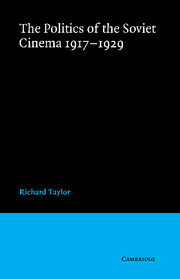Book contents
- Frontmatter
- Contents
- Preface
- Acknowledgements
- Note on transliteration
- Abbreviations
- 1 The pre-history of the Soviet cinema
- 2 The Bolsheviks, propaganda and the cinema
- 3 Revolution and Civil War
- 4 The disorganisation of organisation: the early twenties
- 5 The organisation of disorganisation: the later twenties
- 6 The Party takes control
- 7 Theory and film
- 8 Conclusions
- Notes
- Bibliography
- Index
2 - The Bolsheviks, propaganda and the cinema
Published online by Cambridge University Press: 07 October 2011
- Frontmatter
- Contents
- Preface
- Acknowledgements
- Note on transliteration
- Abbreviations
- 1 The pre-history of the Soviet cinema
- 2 The Bolsheviks, propaganda and the cinema
- 3 Revolution and Civil War
- 4 The disorganisation of organisation: the early twenties
- 5 The organisation of disorganisation: the later twenties
- 6 The Party takes control
- 7 Theory and film
- 8 Conclusions
- Notes
- Bibliography
- Index
Summary
Of all the arts for us the cinema is the most important.
Lenin, 1922.When the Bolsheviks seized power in October 1917 they took control only of the ‘commanding heights’ of a disintegrating administrative machine, a machine whose malfunctioning had largely contributed to the collapse of the previous system of political control. While the machine itself, and those who staffed it, were not necessarily anti-Bolshevik, neither were they inherently anti-tsarist. Their position may be appropriately compared with the ineffectual inertia of the now fallen Provisional Government, and for this reason the Bolsheviks could not rely on the existing machinery of government for the transmission and execution of their orders, let alone use it actively as an instrument for social and political change. The situation was further complicated by the reaction of the non-Bolshevik forces to the October Revolution. The ravages of famine, disease and armed insurrection in the provinces that characterised the first three years of Soviet power effectively prevented the ‘party of the masses’ from establishing, let alone maintaining, contact with the masses in whose name it claimed to be acting, and thus exposed the fundamental weakness of the Bolsheviks' political position. Ruptured communications between the centre and the periphery brought difficulties in both the practical and theoretical fields; it was an emergency situation that demanded emergency measures.
- Type
- Chapter
- Information
- The Politics of the Soviet Cinema 1917–1929 , pp. 26 - 42Publisher: Cambridge University PressPrint publication year: 1979

